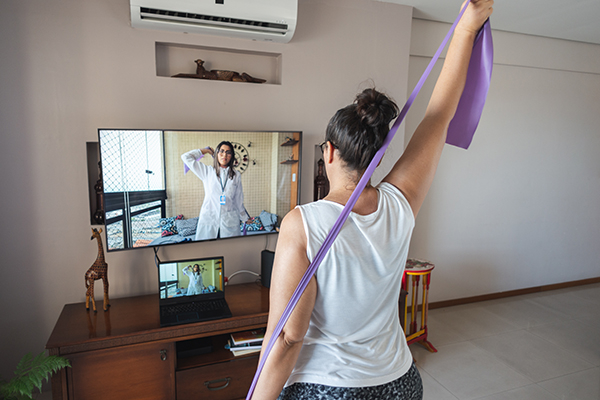
Dr. Josep Alemany, researcher at the Universidad Internacional Iberoamericana (International Iberoamerican University, UNIB), is participating in a study that develops an intelligent system capable of classifying physiotherapeutic exercises with the aim of improving the effectiveness of tele-physiotherapy.
Telehealth refers to the provision of medical services, such as diagnoses, consultations and education, through the use of electronic devices such as computers, laptops and cell phones. This approach responds to the needs of an aging world population, with a projected increase in the percentage of people over the age of 60 from 12% to 22% by 2050. For chronically ill older adults, the physical effort of traveling long distances to receive medical care presents a significant challenge. Telehealth offers a crucial solution by enabling remote access to medical services, overcoming these barriers.
The COVID-19 pandemic has accelerated the adoption of telehealth, improving service delivery. Research indicates that approximately 90% of patients and caregivers feel more confident with telehealth appointments compared to face-to-face visits, underscoring its growing importance in improving healthcare accessibility and patient confidence.
Telehealth has proven advantageous for remote physical therapy, focused on diagnosing and treating impairments that affect functional activities. Physical therapy generally includes exercises essential for patient rehabilitation. Accurate and consistent execution of these exercises allows therapists to adjust treatment as needed. Traditionally, physical therapy involves direct interaction with therapists who guide patients to correct errors in the exercises. However, the length and frequency of sessions can make it difficult for patients to adhere to their regimens. Remote physical therapy via telehealth addresses these problems by providing continuous support and monitoring, thereby improving patient engagement and compliance with prescribed exercises.
In this context, the study developed an innovative system for classifying physiotherapeutic arm exercises. Using PoseNet, a convolutional neural network that captures and analyzes human body movements in real time, providing detailed posture and movement data, combined with ensemble models, which combine multiple machine learning algorithms to improve accuracy, the system can classify exercises more efficiently and accurately than traditional methods.
Tree-based machine learning classifiers, such as Random Forest (RF), Extra Tree Classifier (ETC), XGBoost, LightGBM and Hist Gradient Boosting, were used to train the system because of their ability to handle complex data and their effectiveness in multiclass classification tasks. The analysis of the classifiers showed that Random Forest (RF) is suitable for exercise recognition due to its ability to handle diverse classes and avoid overfitting; it showed an accuracy of 98.2%.
On the other hand, combined classification models such as RandomLightHist Fusion and StackedXLightRF were developed, with the former standing out with a remarkable accuracy of 99.6%, outperforming the individual classifiers. The remarkable performance of this model is due to the combination of three powerful classifiers: Hist Gradient Boosting (HGB), LightGBM (LGBM) and RF. The synergy between these models boosts the gradient boosting capabilities and improves accuracy. In addition, the model proved to be robust to gender variations, maintaining its efficacy across different body types. These results highlight the model's adaptability in real-world applications.
The study highlights the ability of these models to adapt to different types of exercises and individual patient variations. This is crucial, as it allows physiotherapists to design more effective rehabilitation programs tailored to the specific needs of each individual. In addition, the implementation of this technology could reduce the need for constant supervision by professionals, allowing patients to perform exercises at home with confidence.
To learn more about this study, click here.
To read more research, consult the UNIB repository.
The International Iberoamerican University (UNIB) offers a variety of study programs, such as the Master's Degree in Strategic Management with Specialization in Information Technology. A program that provides professionals with the skills and capabilities needed to manage management positions and lead organizational change projects using ICTs or advise companies that want to join the competitiveness of new businesses. Join the business development by studying our master's program and get ready to take your career to the next level!